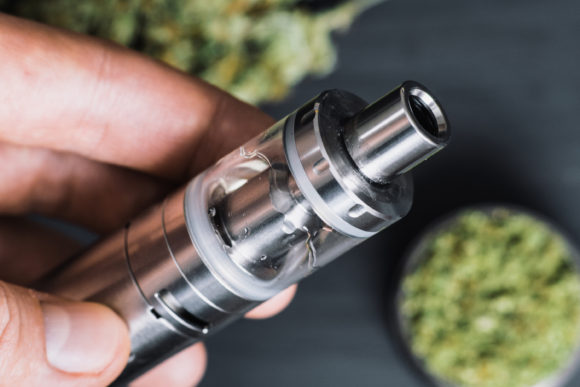On the tail-end of what turned out to be an extremely risky year for cannabis companies, one must wonder what 2020 has in store for a quasi-legal industry that is contending with a vaping crisis, contentious politics at all levels of government and ongoing financial concerns.
Rocco Petrilli, chief operating officer and board chair of the National Cannabis Risk Management Association, a Pittsburgh, Pa.-based nonprofit, says the top risk worries for the group’s 2,000-plus members may not be what you’d expect.
Slip-and-falls at a growing number of marijuana dispensaries? Finding affordable product liability insurance? An unusually cold winter ruining crops? Adequate quality control?
Surely the latter? A growing number of cannabis businesses themselves have called for tougher safety rules for ingredients and devices used in vaping as health officials continue to investigate a wide range of products and chemicals that could be causing the illness that have sickened over 1,600 people nationwide – most cases have involved products containing the marijuana compound THC, typically obtained from illegal sources.
No, it’s none of the above, says Petrilli.
The cannabis industry is still young, and it’s still quite unique in the types of risks it faces.
What’s driving the uniqueness of those risks is largely the perception of cannabis is bad, according to him.
“The risks that the cannabis business owners are facing are not inherent in cannabis, but they come from the outside world that are inflicted on them,” Petrilli says.
Regulators, politicians, and even the media have manufactured many of the industry’s risks, such as preventing legitimate banking activities.
Because cannabis is still considered a Schedule I drug, right up there with heroin and LSD, cannabis operators are unable to do businesses with federally insured banks.
This forces many companies to do business with cash, this is a risk, and many companies find it difficult to get financing, which is also a risk for operations that must grow to keep up with well-funded competition.
Other business sectors shy away from the cannabis industry, either because of its status in the eyes of the federal government, or because it’s perceived as a risky business.
Affordable property insurance, for example, has been difficult for his members to find, because of lack of options and insurers who are still trying to get a handle the risk profiles of these companies, says Petrilli.
NCRMA has polled its members to get a feel of what they are hearing and seeing, and Petrilli says they aren’t worried about the same things that traditional underwriters are.
“When I ask, ‘What is your biggest risk?’ it doesn’t fall anywhere near what the traditional definition of risk that has been dictated to us by insurance companies,” he said.
The three biggest risk to NCRMA members are:
- What Petrilli calls “the people issue.”
- Media and other communications channels.
- Financial risks: banking; payment processing; financing; and funding.
The top risk he hears about from members is the lack of people to grow businesses in an employment market that heavily favors job seekers.
“There are more jobs than there are applicants,” Petrilli says.
It’s a good jobs market across most industries, but compounding this has been rapid growth in the cannabis industry, and the industry itself is a strong draw for Millennials, who don’t tend to be as loyal as past generations and are likely to switch jobs more often.
The perception of the industry in media and the eyes of the public as being negative, or at the least “freewheeling,” hasn’t helped companies in endeavors like getting permits to operate from local governments, gaining broader public acceptance, or buying insurance, according to Petrilli.
The negative press coverage and public perceptions has the industry itself confused.
“What our members are telling us is we don’t know what to read, we don’t know what to listen to, we don’t know what to believe,” Petrilli said.
The financial risks are evident, and many have high hopes for the eventual passage of the Secure and Fair Enforcement Banking Act, H.R. 1595, or SAFE ACT, to address some of those risks.
On top of all those risks, the cannabis industry is still developing – a legitimate concern for lenders and insurers.
“Many of the cannabis owners are, no pun intended, grass roots people,” Petrilli acknowledges.
Once the vaping crisis passes, these are among the risks that will be at the forefront of NCRMA’s efforts.
Petrilli believes that vaping, while it’s currently in the forefront of the public mind, has not been viewed by the industry as the risk it’s perceived as.
He believes that’s because vaping is one delivery method, it’s a problem with the vaping industry more than the cannabis industry itself, and that the buzz around the issue is in part due to the perception that cannabis is a bad thing.
“It’s really not a concern that it’s a such a controversy, like vaping can kill the golden goose, it’s really not on their radar screens,” he says.
Related:
- Report: Cannabis Dispensaries May Become ‘Most Profitable’ Specialty Stores
- California Cannabis Market on Track to Hit $3.1B, Report Shows
- California Governor’s OK of Cannabis Tax Bill Among Several Industry-Related Bills He Signed
Topics Cannabis
Was this article valuable?
Here are more articles you may enjoy.



 Florida Regulators Crack the Whip on Auto Warranty Firm, Fake Certificates of Insurance
Florida Regulators Crack the Whip on Auto Warranty Firm, Fake Certificates of Insurance  US Supreme Court Rejects Trump’s Global Tariffs
US Supreme Court Rejects Trump’s Global Tariffs  Florida Engineers: Winds Under 110 mph Simply Do Not Damage Concrete Tiles
Florida Engineers: Winds Under 110 mph Simply Do Not Damage Concrete Tiles  Jury Finds Johnson & Johnson Liable for Cancer in Latest Talc Trial
Jury Finds Johnson & Johnson Liable for Cancer in Latest Talc Trial 

